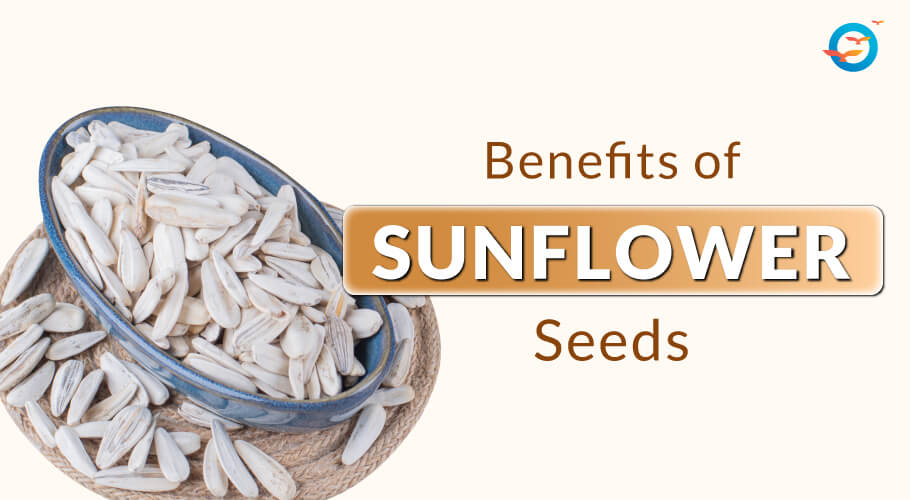Health Benefits of Sunflower Seeds

Sunflower seeds for diabetes
Sunflower seeds are a diabetic-friendly snack, rich in nutrients like magnesium and fiber. They help regulate blood sugar levels and support overall heart health. Sunflower seeds and diabetes
Sunflower reminds us of beautiful summers. Its radiant color gives us the feeling of happiness and positivity. It has got its scientific name Helianthus from two Greek words "helios" which means sun, and "Anthus" which means flower.
Sunflower also symbolizes positivity and strength to admiration and loyalty. Chinese people consider sunflowers as lucky which give lasting happiness and so they are often given at the start of new things and graduations.
Sunflowers are definitely the most popular summer blooms but did you know that sunflower seeds also do have a lot of importance?
Let us first see what are the nutrition facts about sunflower seeds:
Sunflower seeds are obtained from the big flower heads of the plant. The edible seed variety has a nutty and mild flavor.
1 ounce or 1/4 cup or 30 grams sunflower seeds contain:
|
Calories |
163 |
|
Total fat, which includes |
14 grams |
|
Saturated fat |
1.5 grams |
|
Polyunsaturated fat |
9.2 grams |
|
Monounsaturated fat |
2.7 grams |
|
Protein |
5.5 grams |
|
Carbs |
6.5 grams |
|
Fiber |
3 grams |
|
Vitamin E |
37% of the RDI |
|
Niacin |
10% of the RDI |
|
Vitamin B6 |
11% of the RDI |
|
Folate |
17% of the RDI |
|
Pantothenic acid |
20% of the RDI |
|
Iron |
6% of the RDI |
|
Magnesium |
9% of the RDI |
|
Zinc |
10% of the RDI |
|
Copper |
26% of the RDI |
|
Manganese |
30% of the RDI |
|
Selenium |
32% of the RDI |
Benefits of Sunflower Seeds (Helianthus annuus):
- Sunflower seeds are a rich source of several nutrients which help prevent chronic diseases.
- Those nutrients are selenium, beneficial plant compounds (phenolics and flavonoids), and vitamin E.
- The magnesium, protein, linoleic fatty acids and plant compounds present in sunflower seeds do play a big role in lowering blood pressure, cholesterol, and blood sugar.
- Consumption of sunflower seeds helps in reducing the risk of inflammation, heart disease, and type 2 diabetes.
How to consume sunflower seeds?
Sunflower seeds which are unshelled is a popular snack but shelled varieties can be eaten straight away or added to various foods such as salads, trail mix,
and baked foods
Sunflower seeds can be eaten in various ways like -
- Add to trail mix.
- Add in homemade granola bars
- Have with a green leafy salad.
- Add to cereal.
- Add to fruits.
- Sprinkled over fried/saute vegetables
Important Note about sunflower seeds-
Sunflower seeds contain a good amount of fat and so are prone to becoming rancid. Hence one should store them in an airtight container.
To summarize, sunflower seeds are a great crunchy and nutty snack which are packed with plant compounds and various nutrients. These nutrients largely help one fight type 2 diabetes, heart disease, and inflammation.
Diabetics, do think of adding sunflower seeds to your diet. Was this blog useful? Then why not share it
Do read another interesting blog on pumpkin seeds
Visit our Facebook page to know all about forthcoming events.
FAQs
Are sunflower seeds good for diabetics?
Yes, Sunflower seeds are rich in healthy fats, fiber, and protein, which help regulate blood sugar levels and improve heart health.
What are 5 health benefits of sunflower seeds?
1. Prevention of chronic diseases
2. Balance your blood sugar level
3. Support thyroid health and lower inflammation
4 Supports Weight Management
5. Promotes Skin Health
How do sunflower seeds help with diabetes management?
Sunflower seeds have a low glycemic index and are packed with fiber, which slows down sugar absorption and helps stabilize blood sugar.
Can sunflower seeds lower blood sugar?
While they don’t directly lower blood sugar, the fiber and protein in sunflower seeds help prevent sudden spikes in glucose levels.
How should diabetics consume sunflower seeds?
Diabetics can consume sunflower seeds as a snack, in salads, or mixed with yogurt. Avoid salted or roasted seeds with added oils.
How much sunflower seeds should a diabetic eat daily?
Diabetics can eat about 1 to 2 tablespoons of sunflower seeds daily as part of a balanced diet. Shelled sunflower seeds can be eaten on their own or added to foods like salads, trail mixes, or yogurt for a healthy snack.
Disclaimer:
This Blog solely serves our marketing purposes, for Authentic knowledge for this topic, Please join our upcoming Discover Reversal Session

